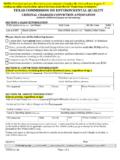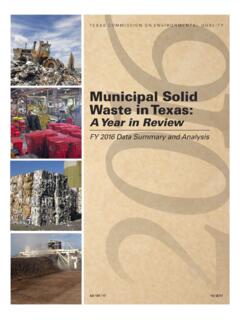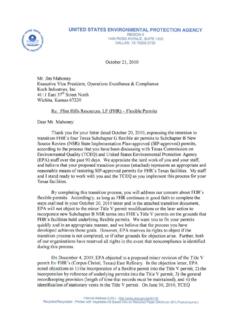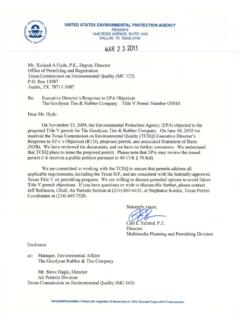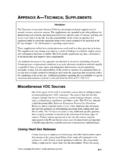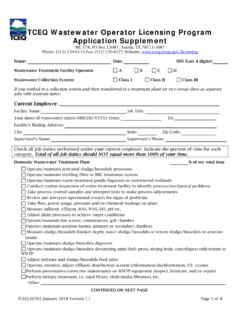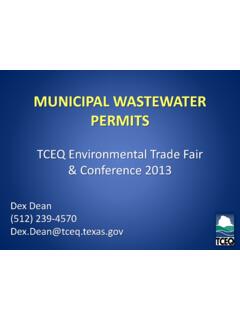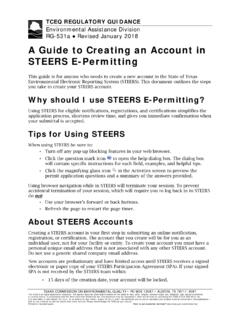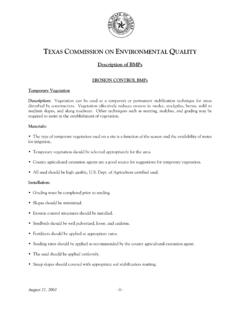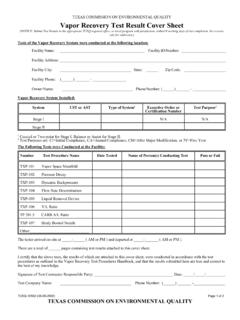Transcription of Waste from Grease Traps, Grit Traps, and Septic Tanks
1 TCEQ REGULATORY GUIDANCE Small Business and Environmental Assistance RG-389 Revised June 2014 TEXAS COMMISSION ON ENVIRONMENTAL QUALITY PO BOX 13087 AUSTIN, TX 78711-3087 The TCEQ is an equal opportunity employer. The agency does not allow discrimination on the basis of race, color, religion, national origin, sex, disability, age, sexual orientation, or veteran status. In compliance with the Americans with Disabilities Act, this document may be requested in alternate formats by contacting the TCEQ at 512-239-0028, fax 512-239-5010, or 800-RELAY-TX (TDD), or by writing PO Box 13087, Austin TX 78711-3087.
2 We authorize you to use or reproduce any original material contained in this publication that is, any material we did not obtain from other sources. Please acknowledge the TCEQ as your source. Printed on recycled paper. Waste from Grease Traps, Grit Traps, and Septic Tanks : Questions and Answers This publication is for those who generate Waste from Grease traps, grit traps, and Septic Tanks , including homeowners with Septic Tanks . If you generate any of these types of Waste , it is important for you to know and comply with regulations because you are responsible for managing the Waste from the time it is generated, transported, and processed to the time of final disposal.
3 This guide answers many questions the Texas Commission on Environmental Quality receives about its Waste regulations. This publication is for general guidance only. It does not take the place of any state or local regulations. I refers to a business, individual, or other generator of Waste . Grease -Trap Waste Am I required to have a Grease trap? A Grease trap is required for any facility (including municipal, state, or federal) whose business activity is the source of cooking Grease or oil in sewage such as restaurants, cafeterias, and food-processing plants and is located in an area that has adopted a plumbing code.
4 Plumbing codes do not allow discharges of Grease into the sewers because discharges block the lines. Who regulates my Grease trap? Grease traps are regulated by the Texas Department of State Health Services (DSHS), your local wastewater utility, or both. The TCEQ regulates the pumping (evacuation), transportation, and disposal of all Grease -trap Waste . The TCEQ may regulate the design, size, and installation of Grease traps and interceptors during the permitting of a Septic system. Do I have to register my Grease trap? Grease traps do not need to be registered with the TCEQ; however, local authorities may require registration.
5 Waste from Grease Traps, Grit Traps, and Septic Tanks TCEQ publication RG-389 2 June 2014 Who can pump my Grease trap? Only transporters registered with the TCEQ can legally pump and transport Grease -trap Waste . You may call your regional TCEQ office for a list of registered transporters in your area. May I dispose of my own Grease -trap wastes? You must be registered with the TCEQ as a transporter and meet all of the reporting requirements to haul Waste from Grease traps. All liquid Waste including Grease -trap, grit-trap, and Septic -tank Waste must be transported by registered haulers.
6 TCEQ rules do not apply to yellow Grease that is to be rendered from fryers. However, you must comply with DSHS requirements concerning yellow Grease . Grit-Trap Waste Am I required to have a grit trap? Grit traps are required for permanent car washes and wash bays located in an area that has adopted a plumbing code. Grit cannot be discharged into a sewer because it blocks lines and may damage city pumps. Who regulates my grit trap? Grit traps are regulated under your local plumbing code and by your local wastewater utility. The TCEQ regulates the pumping (evacuation), transportation, and disposal of all grit-trap Waste .
7 Do I have to register my grit trap? Grit traps do not need to be registered with the TCEQ; however, local authorities may require registration. Who can pump my grit trap? Only transporters registered with the TCEQ can legally pump and transport wet grit-trap Waste . You may call your regional TCEQ office for a list of registered transporters in your area or visit< sludgetransporter>. Some operators of car washes dry their own grit-trap Waste by using evaporation beds see 30 TAC (h).1 While Texas rules do not give construction specifications for the beds, they must be designed and maintained to prevent water or Waste from escaping into the surrounding area or storm drains.
8 This rule is not an exception from the sludge transporter requirements. Any other treatment of these wastes must be authorized by the TCEQ. (See the last page of this publication for information about finding rules on the TCEQ website.) 1 Short for Title 30, Texas Administrative Code, Subsection (h). TCEQ publication RG-389 Waste from Grease Traps, Grit Traps, and Septic Tanks June 2014 3 May I dispose of my own grit-trap wastes? All grit-trap wastes wet or dry must be disposed of at an authorized facility.
9 Because grit-trap wastes may be contaminated with benzene, lead, oils, and other automotive fluids, landfills usually require tests before accepting these wastes. Not all landfills can accept grit-trap Waste , so please call the landfill before transporting. Septic -Tank Waste Who regulates my Septic tank? Septic Tanks are regulated by the TCEQ directly or by a TCEQ-authorized agent from local government. The TCEQ regulates the installation of Septic Tanks , as well as the pumping (evacuation), transportation, processing, and disposal of Septic -tank Waste .
10 Do I have to register my Septic tank? The TCEQ or TCEQ-authorized agent must authorize construction of your Septic system before its installation, and then inspect the system when installation is complete to formally permit the system and authorize operation. Permits are also required for existing systems that are upgraded or repaired. (See the last page of this publication for contact information about Septic Tanks , also known as on-site wastewater or sewage facilities or OSSFs.) Who can pump my Septic tank? Only transporters registered with the TCEQ can legally pump and transport Septic -tank Waste .
